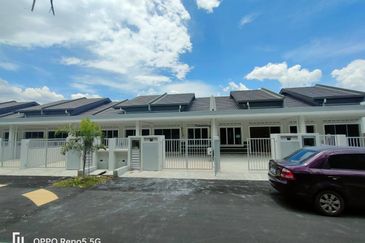
- This is the MPC’s third consecutive 25bps OPR hike this year, in line with 17 economists’ forecast polled by Bloomberg, bringing year-to-date increase to 75bps.
- The OPR increase came as Malaysia’s 2022 gross domestic product (GDP) growth outlook also continued to improve, with Bloomberg consensus forecast raised to 6.8%, from 6.2% in August.
KUALA LUMPUR (Sept 8): Bank Negara Malaysia (BNM)’s Monetary Policy Committee (MPC) has raised its overnight policy rate (OPR) by 25 basis points (bps) to 2.5% on Thursday (Sept 8), in line with expectations for further normalisation of monetary policy as the country’s economic growth and inflation gain momentum.
This is the MPC’s third consecutive 25bps OPR hike this year, in line with 17 economists’ forecast polled by Bloomberg, bringing year-to-date increase to 75bps.
The ceiling and floor rates of the OPR's corridor are correspondingly increased to 2.75% and 2.25% respectively, according to a statement by the central bank.
“With the positive growth prospects for the Malaysian economy remaining intact, the MPC decided to further adjust the degree of monetary accommodation. At the current OPR level, the stance of monetary policy continues to remain accommodative and supportive of economic growth,” it said.
The OPR increase came as Malaysia’s 2022 gross domestic product (GDP) growth outlook also continued to improve, with Bloomberg consensus forecast raised to 6.8%, from 6.2% in August.
In its statement, BNM said the MPC is not on any pre-set course and will continue to assess evolving conditions and their implications on the overall outlook to domestic inflation and growth.
“Any adjustments to the monetary policy settings going forward would be done in a measured and gradual manner, ensuring that monetary policy remains accommodative to support a sustainable economic growth in an environment of price stability,” it said.
MPC’s latest OPR rate of 2.5% inched closer to its pre-pandemic level of 3.0%, and closed its gap to the 2.25%-2.5% US Fed Fund rate, which is widely expected to be raised by another 75bps later this month.
BNM said going forward, indicators point to continued growth, underpinned by support from private sector spending.
“Labour market conditions and income prospects remain positive, with unemployment and underemployment declining further. The reopening of international borders will lift tourism-related sectors. Investment activity and prospects would be supported by the realisation of multi-year projects,” it said.
Nevertheless, the central bank said external demand is expected to moderate following softening global growth. Further, the increased volatility expected in the global financial and foreign exchange markets is not expected to derail Malaysia's growth, it said.
“Domestic liquidity remains sufficient, with continued orderly functioning of the financial and foreign exchange markets. Financial institutions also continue to operate with strong capital and liquidity buffers. These will ensure financial intermediation remains supportive of the economy,” it said.
Going forward, BNM said downside risks to the domestic economy continue to stem from weaker-than-expected global growth, further escalation of geopolitical conflicts, and worsening supply chain disruptions.
“Global growth is expected to face challenges from the impact of monetary policy tightening in most economies, and pandemic management measures in China.
“The growth outlook is subject to downside risks, including elevated cost pressures, the potential energy crisis in Europe, and sharp tightening in financial market conditions,” it said.
On inflation, BNM said the headline consumer price index (CPI) is projected to peak in the third quarter of 2022 (3Q2022) before moderating thereafter, due to dissipating base effects and in line with the expected easing of global commodity prices.
“Underlying inflation, as measured by core inflation, is expected to average closer to the upper end of the 2.0%-3.0% forecast range in 2022, with some signs of demand-driven pressures amid the high-cost environment.
“The extent of upward pressures to inflation will remain partly contained by existing price controls, fuel subsidies, and the prevailing spare capacity in the economy,” it said.
The inflation outlook, however, continues to be subject to domestic policy measures, as well as global commodity price developments arising mainly from the ongoing military conflict in Ukraine and prolonged supply-related disruptions, said the central bank. Malaysia’s headline inflation rose 2.8% year-on-year in the second quarter, from 2.2% in 1Q2022.
The MPC raised OPR in May for the first time in two years after maintaining the benchmark interest rate at a historical low of 1.75% since July 2020 to cushion the economic impact of the pandemic.
TOP PICKS BY EDGEPROP

Taman Tun Dr Ismail (TTDI)
Taman Tun Dr Ismail, Kuala Lumpur

Seksyen 14, Petaling Jaya
Petaling Jaya, Selangor

Seksyen 14, Petaling Jaya
Petaling Jaya, Selangor

Duduk Se.Ruang @ Eco Sanctuary
Kuala Langat, Selangor

Duduk Se.Ruang @ Eco Sanctuary
Kuala Langat, Selangor

Duduk Se.Ruang @ Eco Sanctuary
Kuala Langat, Selangor

Duduk Se.Ruang @ Eco Sanctuary
Kuala Langat, Selangor

Duduk Se.Ruang @ Eco Sanctuary
Kuala Langat, Selangor

Regent Garden @ Eco Grandeur
Bandar Puncak Alam, Selangor

Bandar Baru Sri Petaling
Bandar Baru Sri Petaling, Kuala Lumpur















